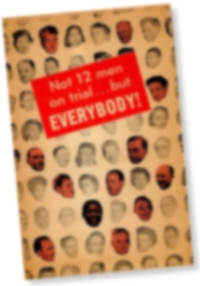 A century ago, America was immersed in social change. Some of the issues in the headlines during this period were women’s suffrage, the treatment of immigrants, prison and asylum reform, temperance and prohibition, racial inequality, child labor and compulsory elementary school education, women’s education and protection of women from workplace exploitation, equal pay for equal work, communism and utopian societies, unions and the labor movement, and pure food laws.
A century ago, America was immersed in social change. Some of the issues in the headlines during this period were women’s suffrage, the treatment of immigrants, prison and asylum reform, temperance and prohibition, racial inequality, child labor and compulsory elementary school education, women’s education and protection of women from workplace exploitation, equal pay for equal work, communism and utopian societies, unions and the labor movement, and pure food laws.
The social turmoil of the past makes today’s focus on gay marriage and abortion look almost inconsequential by comparison.
What’s especially interesting is Christianity’s role in some of these movements. Christians will point with justifiable pride to schools and hospitals build by churches or religious orders. The Social Gospel movement of the early 20th century pushed for corrections of many social ills—poverty and wealth inequality, alcoholism, poor schools, and more. Christians point to Rev. Martin Luther King’s work on civil rights and William Wilberforce’s Christianity-inspired work on ending slavery.
(This doesn’t sound much like the church today, commandeered as it is by conservative politics, but that’s another story.)
Same-sex marriage seems inevitable, just another step in the march of civil rights. Jennifer Roback Morse, president and founder of the Ruth Institute for promotion of heterosexual marriage and rejection of same-sex marriage, was recently asked if she feared being embarrassed by the seeming inevitability of same-sex marriage. She replied:
On the contrary, [same-sex marriage proponents] are the ones who are going to be embarrassed. They are the ones who are going to be looking around, looking for the exits, trying to pretend that it had nothing to do with them, that it wasn’t really their fault.
I am not the slightest bit worried about the judgment of history on me. This march-of-history argument bothers me a lot. … What they’re really saying is, “Stop thinking, stop using your judgment, just shut up and follow the crowd because the crowd is moving towards Nirvana and you need to just follow along.”
Let’s first acknowledge someone who could well be striving to do the right thing simply because it’s right, without concern for popularity or the social consequences. I would never argue that someone ought to abandon a principle because it has become a minority opinion or that it is ridiculed. If Dr. Morse sticks to her position solely because she thinks it’s right, and she’s not doing it because of (say) some political requirement or because her job depends on it, that’s great.
Nevertheless, the infamous 1963 statement from George Wallace comes to mind: “I say segregation now, segregation tomorrow, segregation forever.” That line came back to haunt him. To his credit, he apologized and rejected his former segregationist policies, but history will always see him as having chosen the wrong side of this issue.
Christianity has similarly scrambled to reposition itself after earlier errors. Christians often claim that modern science is built on a Christian foundation, ignoring the church’s rejection of science that didn’t fit its medieval beliefs (think Galileo). They take credit for society’s rejection of slavery, forgetting Southern preachers and their gold mine of Bible verses for ammunition. They reposition civil rights as an issue driven by Christians, ignoring the Ku Klux Klan and its burning cross symbol, biblical justification for laws against mixed-race marriage, and slavery support as the issue that created the Southern Baptist Convention.
Mohandas Gandhi had considerable experience as the underdog. He said, “First they ignore you, then they ridicule you, then they fight you, then you win.”
(And then they claim that it was their idea all along!)
The same-sex marriage issue in the United States has almost advanced to “then you win” stage. Check back in two decades, and you’ll see Christians positioning the gay rights issue as one led by the church. They’ll mine history for liberal churches that took the lead (and flak) in ordaining openly gay clerics and speaking out in favor of gay rights.
If someone truly rejects same-sex marriage because their unbiased analysis shows it to be worse for society, great. But it is increasingly becoming clear how history will judge that position.
Truth never damages a cause that is just.
— Mohandas Gandhi
Photo credit: Spec-ta-cles
Related posts:
- The first post in this series is here: Homosexuality v. Christianity
- Marriage—Designed for Procreation?
- Biblical Marriage: Not a Pretty Picture
- Marriage vs. Religious Freedom
- Confused Thinking About Homosexuality
Related links:
- “Dr. Jennifer Roback Morse, Are Defenders of Natural Marriage on the Wrong Side of History?” Issues Etc., 5/25/12.
- “Pure Religion: Revivalism and Reform in Early 19th-Century America,” The Dartmouth Apologia, Spring 2010, pp 20–24.


 Today is the National Day of Prayer. How about a National Day of Actually Doing Something instead?
Today is the National Day of Prayer. How about a National Day of Actually Doing Something instead? Imagine that an atheist walks into a gathering of Christians. He says, “I hold in my hand a pamphlet that will rock your worldview. In fact, it will almost surely change your worldview. I have shown this to several hundred Christians of many denominations, and shortly after they read it, 90% admitted that their faith in the truth of Christianity was pretty much gone.
Imagine that an atheist walks into a gathering of Christians. He says, “I hold in my hand a pamphlet that will rock your worldview. In fact, it will almost surely change your worldview. I have shown this to several hundred Christians of many denominations, and shortly after they read it, 90% admitted that their faith in the truth of Christianity was pretty much gone. Suppose Einstein’s catastrophic World War III happened and civilization was destroyed. After a thousand years, civilization returns to roughly our level of scientific awareness.
Suppose Einstein’s catastrophic World War III happened and civilization was destroyed. After a thousand years, civilization returns to roughly our level of scientific awareness. Welcome to post #100! It’s time to see how far this blog has come since I started last August.
Welcome to post #100! It’s time to see how far this blog has come since I started last August.
